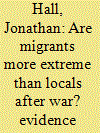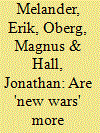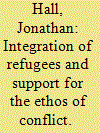| Srl | Item |
| 1 |
ID:
143296


|
|
|
|
|
| Summary/Abstract |
Little is known about the attitudes of migrant populations originating from countries affected by conflict. This article examines a key assumption in the literature: that migrants harbor more conflictive attitudes than locals after war. Until now, we simply lacked the micro-level data necessary to examine migrant attitudes directly. Rather than relying on indirect evidence, I analyze new data from simultaneous surveys conducted in Sweden and Bosnia in 2010. As a whole, the empirical analysis supports the article’s novel theoretical approach. Under certain conditions, migration may promote inclusive and reconciliatory attitudes by improving access to coping resources and providing an exit from detrimental wartime and postwar conditions in origins countries.
|
|
|
|
|
|
|
|
|
|
|
|
|
|
|
|
| 2 |
ID:
091918


|
|
|
|
|
| Publication |
2009.
|
| Summary/Abstract |
It is widely believed that the human impact of civil conflict in the present era is especially destructive. Proponents of the 'new wars' thesis hold that today's conflicts are fuelled by exclusive identities, motivated by greed in the absence of strong states, and unchecked by the disinterested great powers, resulting in increased battle severity, civilian death and displacement. The ratio of civilian to military casualties is claimed to have tilted, so that the overwhelming majority of those killed today are civilians. Using systematic data that are comparable across cases and over time we find that, contrary to the 'new wars' thesis, the human impact of civil conflict is considerably lower in the post-Cold War period. We argue that this pattern reflects the decline of ideological conflict, the restraining influence of globalization on governments, and the increasing rarity of superpower campaigns of destabilization and counter-insurgency through proxy warfare.
|
|
|
|
|
|
|
|
|
|
|
|
|
|
|
|
| 3 |
ID:
161608


|
|
|
|
|
| Summary/Abstract |
Following forced expulsion and campaigns of ethnic cleansing, substantial portions of national communities affected by conflict no longer live within the boundaries of the state. Nevertheless, existing wartime and postwar public opinion research is largely confined to countries directly affected by conflict. As a result, current research may overlook important war-affected populations and processes shaping their opinions. I address this problem by examining the question: does incorporation in settlement countries reduce support for conflict ideology? Examining this question requires new microdata. I examine the results of a large-scale survey of ex-Yugoslavs in Sweden. The findings suggest that incorporation undermines support for conflict ideology by increasing the socioeconomic security and social identity complexity of migrants. This has important implications for multiculturalism policies in the context of the current global migration crisis.
|
|
|
|
|
|
|
|
|
|
|
|
|
|
|
|